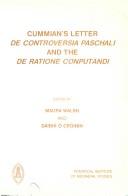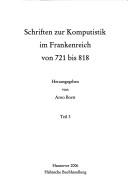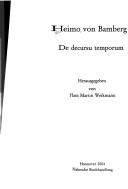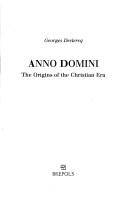| Listing 1 - 10 of 16 | << page >> |
Sort by
|
Book
ISBN: 0860360598 9780860360599 Year: 1977 Publisher: London Collings
Abstract | Keywords | Export | Availability | Bookmark
 Loading...
Loading...Choose an application
- Reference Manager
- EndNote
- RefWorks (Direct export to RefWorks)
Islamic calendar --- Church calendar --- 930.24 --- Historische chronologie --- 930.24 Historische chronologie --- Calendar, Islamic --- Muslim calendar --- Calendar --- Calendar, Ecclesiastical --- Computus ecclesiasticus --- Ecclesiastical calendar --- Heortology --- Religious calendars --- Fasts and feasts --- Christianity
Book
ISBN: 9782503533179 2503533175 9782503538822 Year: 2010 Volume: 5 Publisher: Turnhout Brepols
Abstract | Keywords | Export | Availability | Bookmark
 Loading...
Loading...Choose an application
- Reference Manager
- EndNote
- RefWorks (Direct export to RefWorks)
The scientific knowledge that Irish, English, and continental European scholars nurtured and developed during the years c. AD 500 to c. AD 1200 was assimilated, in the first place, from the wider Roman world of Late Antiquity. Time-reckoning, calendars, and the minute reckonings required to compute the date of Easter, all involved the minutiae of mathematics (incl. the original concept of ‘digital calculation’) and astronomical observation in a truly scientific fashion. In fact, the ‘Dark Ages’ were anything but dark in the fields of mathematics and astronomy.The first Science of Computus conference in Galway in 2006 highlighted the transmission of Late Antique Mathematical Knowledge in Ireland & Europe, the development of astronomy in Early Medieval Ireland & Europe and the role of the Irish in the development of computistical mathematics. The proceedings of that conference should, therefore, appeal equally to those interested in the history of science in Ireland and Europe, and in the origins of present-day mathematical and astronomical ideas.
Conferences - Meetings --- Calendar --- Church calendar --- Calendrier --- Calendrier liturgique --- History --- Histoire --- Europe --- To 1500 --- Congresses --- Calendar, Ecclesiastical --- Computus ecclesiasticus --- Ecclesiastical calendar --- Heortology --- Religious calendars --- Fasts and feasts --- Computus --- Astronomy --- Chronology, Historical --- Chronology --- Christianity

ISBN: 0888440863 9780888440860 Year: 1988 Volume: 86 Publisher: Toronto Pontifical institute of mediaeval studies
Abstract | Keywords | Export | Availability | Bookmark
 Loading...
Loading...Choose an application
- Reference Manager
- EndNote
- RefWorks (Direct export to RefWorks)
Easter. --- Church calendar --- Pâques --- Calendrier liturgique --- Easter --- History. --- 264-041.61 --- -Church calendar --- -Calendar, Ecclesiastical --- Computus ecclesiasticus --- Ecclesiastical calendar --- Heortology --- Religious calendars --- Calendar --- Fasts and feasts --- Church year --- Holy Week --- Pasen --- History --- Christianity --- Ireland --- Irish Free State --- Religious life and customs. --- -Pasen --- 264-041.61 Pasen --- -264-041.61 Pasen --- Calendar, Ecclesiastical --- Pâques --- Easter - Ireland - History. --- Church calendar - Ireland - History. --- Cumianus Longus ab. Clonfertensis --- Cummianus (Cumianus) Fada (Longus) ab. Clonfertis

ISBN: 3775210210 9783775210218 Year: 2006 Volume: 21 Publisher: Hannover : Hahnsche Buchhandlung,
Abstract | Keywords | Export | Availability | Bookmark
 Loading...
Loading...Choose an application
- Reference Manager
- EndNote
- RefWorks (Direct export to RefWorks)
Calendar --- Franks --- Calendrier --- Francs --- History --- Histoire --- Germany --- Allemagne --- Calendar reform --- Church calendar --- 091:529 --- Handschriftenkunde. Handschriftencatalogi-:-Chronology. Calendar. Determination of time --- Calendar reform. --- History. --- 091:529 Handschriftenkunde. Handschriftencatalogi-:-Chronology. Calendar. Determination of time --- Computus --- Astronomy --- Chronology, Historical --- Chronology --- Calendar, Ecclesiastical --- Computus ecclesiasticus --- Ecclesiastical calendar --- Heortology --- Religious calendars --- Fasts and feasts --- Reform --- Christianity --- Calendar - France - History --- Church calendar - France - History

ISBN: 3775210199 9783775210195 Year: 2004 Volume: 19 Publisher: Hannovre : Hahnsche Buchhandlung,
Abstract | Keywords | Export | Availability | Bookmark
 Loading...
Loading...Choose an application
- Reference Manager
- EndNote
- RefWorks (Direct export to RefWorks)
World history --- Chronology, Historical --- Calendar --- Histoire universelle --- Chronologie historique --- Calendrier --- Early works to 1800 --- Ouvrages avant 1800 --- Heimo, --- Church calendar --- History --- Calendar, Ecclesiastical --- Computus ecclesiasticus --- Ecclesiastical calendar --- Heortology --- Religious calendars --- Fasts and feasts --- Christianity --- Chronology, Historical - Early works to 1800 --- Church calendar - Early works to 1800 --- World history - Early works to 1800 --- HISTORIOGRAPHIE --- MOYEN AGE
Book
ISBN: 3877100740 9783877100745 Year: 1977 Volume: 14 Publisher: Siegburg Schmitt
Abstract | Keywords | Export | Availability | Bookmark
 Loading...
Loading...Choose an application
- Reference Manager
- EndNote
- RefWorks (Direct export to RefWorks)
Church calendar --- -Church calendar --- -#GROL:SEMI-264-045 --- 235.3*2 --- 235.3*15 --- Calendar, Ecclesiastical --- Computus ecclesiasticus --- Ecclesiastical calendar --- Heortology --- Religious calendars --- Calendar --- Fasts and feasts --- Hagiografie: patrocinia --- Hagiografie: vereringsgeschiedenis --- Christianity --- 235.3*15 Hagiografie: vereringsgeschiedenis --- 235.3*2 Hagiografie: patrocinia --- #GROL:SEMI-264-045 --- Church calendar - Germany - Cologne Region --- Church calendar - Netherlands --- Church calendar - Germany (West)

ISBN: 3775209026 9783775209021 Year: 2001 Volume: 2 Publisher: Hannovre : Hahnsche Buchhandlung,
Abstract | Keywords | Export | Availability | Bookmark
 Loading...
Loading...Choose an application
- Reference Manager
- EndNote
- RefWorks (Direct export to RefWorks)
History as a science --- Chronology --- anno 800-1199 --- Calendar [Ecclesiastical ] --- Calendar [Germanic ] --- Calendrier chrétien --- Calendrier germanique --- Christelijke tijdrekening --- Christian era --- Church calendar --- Computus [Christelijke ] --- Computus [Christian ] --- Computus chrétien --- Ecclesiastical calendar --- Ere chrétienne --- Kalender [Germaanse ] --- Tijdrekening [Christelijke ] --- Calendar, Germanic --- Calendar --- Carolingians --- Calendrier --- Calendrier liturgique --- Carolingiens --- History --- Sources --- Histoire --- Holy Roman Empire --- Saint empire romain germanique --- Calendar, Germanic. --- Church calendar. --- Calendar, Ecclesiastical --- Computus ecclesiasticus --- Heortology --- Religious calendars --- Fasts and feasts --- Carlovingians --- Carolinians --- Computus --- Astronomy --- Chronology, Historical --- Calendar, Scandinavian --- Germanic calendar --- Scandinavian calendar --- Christianity --- Heiliges Römisches Reich Deutscher Nation --- Heiliges Römisches Reich --- Svi︠a︡shchennai︠a︡ Rimskai︠a︡ Imperii︠a︡ --- Imperium Romano Germanicum --- S.R.I. --- Sacrum Romanum Imperium --- Austria --- Germany --- 843-1273 --- To 1500 --- Calendar - Holy Roman Empire - History - To 1500. --- Carolingians - History - Sources. --- CALENDRIERS --- HISTOIRE --- MOYEN AGE

ISBN: 2503510507 2503510515 9782503510514 Year: 2000 Publisher: Turnhout : Brepols,
Abstract | Keywords | Export | Availability | Bookmark
 Loading...
Loading...Choose an application
- Reference Manager
- EndNote
- RefWorks (Direct export to RefWorks)
Calendrier (chronologie) --- Tijdrekening --- Calendar --- Chronology, Historical --- Calendar reform --- Calendrier --- Chronologie historique --- History --- Early works to 1800 --- Histoire --- Ouvrages avant 1800 --- Réforme --- Dionysius Exiguus, --- 930.24 --- Historische chronologie --- Church calendar --- Church history --- Easter. --- History. --- 930.24 Historische chronologie --- Réforme --- Easter --- Church year --- Fasts and feasts --- Holy Week --- Chronology, Ecclesiastical --- Church chronology --- Ecclesiastical chronology --- Calendar, Ecclesiastical --- Computus ecclesiasticus --- Ecclesiastical calendar --- Heortology --- Religious calendars --- Christianity --- Dionysius Syrus, --- Exiguus, Dionysius, --- Syrus, Dionysius, --- Christian church history --- #gsdb8 --- Chronologie --- Calendriers --- Dionysius,
Book
ISBN: 9782503536682 2503536689 9782503539706 Year: 2011 Volume: 10 Publisher: Turnhout Brepols
Abstract | Keywords | Export | Availability | Bookmark
 Loading...
Loading...Choose an application
- Reference Manager
- EndNote
- RefWorks (Direct export to RefWorks)
2010 saw the publication of the Proceedings of the 1st International Conference on the Science of Computus in Ireland and Europe, which took place in Galway, 14–16 July, 2006. That first collection, which had the sub-title Computus and its Cultural Context in the Latin West, AD 300–1200, brought together papers by ten of the leading scholars in the field, on subjects ranging from the origins of the Annus Domini to the study of computus in Ireland c. 1100. All those who participated in the Conference were unanimous that a second, follow-up event should be organized, and that duly took place (also in Galway), 18–20 July, 2008. The proceedings of that Conference are published in this current volume. The topics covered in the 2nd Galway Conference ranged from the general – but vitally important – vocabulary of computus (i.e., the technical terminology developed by computists to describe what they were doing) to the origins of the different systems used to calculate the date of Easter in Antiquity and the Early Middle Ages. In addition, there was discussion also of the great debates about Easter, epitomized by the famous Synod of Whitby in AD 664, and the role of well-known individuals in the evolution of computistical knowledge (e.g., Anatolius of Laodicea, the African Augustalis, Sulpicius Severus, Victorius of Aquitaine, Cassiodorus, Dionysius Exiguus, Willibrord, the ninth-century Irish scholar-exile, Dicuil, as well as the late-tenth century Abbo of Fleury).
Easter --- Church calendar --- Church history --- Calendar --- Calendars --- Astronomy, Medieval --- Pâques --- Calendrier liturgique --- Eglise --- Calendrier --- Calendriers --- Astronomie médiévale --- History --- Chronology --- Histoire --- Chronologie --- 264-11 --- 398.332.12 --- Liturgische kalender. Martelaarsboeken --- Pasen --- Conferences - Meetings --- 398.332.12 Pasen --- 264-11 Liturgische kalender. Martelaarsboeken --- Pâques --- Astronomie médiévale --- Congresses --- Europe --- To 1500 --- Astronomy [Medieval ] --- History. --- Calendar, Ecclesiastical --- Computus ecclesiasticus --- Ecclesiastical calendar --- Heortology --- Religious calendars --- Fasts and feasts --- Church year --- Holy Week --- Christianity
Book
ISBN: 9780199543120 0199543127 0191720062 9786611978679 1281978671 019156236X Year: 2008 Publisher: Oxford ; New York : Oxford University Press,
Abstract | Keywords | Export | Availability | Bookmark
 Loading...
Loading...Choose an application
- Reference Manager
- EndNote
- RefWorks (Direct export to RefWorks)
The system of numbering the years AD (Anni Domini, Years of the Lord) originated with Dionysius Exiguus. Dionysius drafted a 95-year table of dates for Easter beginning with the year 532 AD. Why Dionysius chose the year that he did to number as '1' has been a source of controversy and speculation for almost 1500 years. According to the Gospel of Luke (3.1; 3.23), Jesus was baptized in the 15th year of the emperor Tiberius and was about 30 years old at the time. The 15th year of Tiberius was AD 29. If Jesus was 30 years old in AD 29, then he was born in the year that we call 2 BC. Most ancient authorities dated the Nativity accordingly.Alden Mosshammer provides the first comprehensive study of early Christian methods for calculating the date of Easter to have appeared in English in more than one hundred years. He offers an entirely new history of those methods, both Latin and Greek, from the earliest such calculations in the late second century until the emergence of the Byzantine era in the seventh century. From this history, Mosshammer draws the fresh hypothesis that Dionysius did not calculate or otherwise invent a new date for the birth of Jesus, instead adopting a date that was already well established in the Greek church. Mosshammer offers compelling new conclusions on the origins of the Christian era drawing upon evidence found in the fragments of Julius Africanus, of Panodorus of Alexandria, and in the traditions of the Armenian church.
Easter --- Church calendar --- Church history --- History --- Dionysius Exiguus, --- Chronology --- -930.24 --- Calendar, Ecclesiastical --- Computus ecclesiasticus --- Ecclesiastical calendar --- Religious calendars --- Holy Week --- Dionysius Syrus, --- Exiguus, Dionysius, --- Syrus, Dionysius, --- 930.24 --- Church year --- Fasts and feasts --- Chronology, Ecclesiastical --- Church chronology --- Ecclesiastical chronology --- Heortology --- Calendar --- 930.24 Historische chronologie --- Historische chronologie --- Christianity --- Easter. --- History. --- Church calendar - History --- Church history - Chronology --- Pâques --- Ère chrétienne --- Dionysius Exiguus, - d. ca. 540 --- Church calendar - History. --- Dionysius Exiguus, - d. ca. 540. --- Dionysius,
| Listing 1 - 10 of 16 | << page >> |
Sort by
|

 Search
Search Feedback
Feedback About
About Help
Help News
News